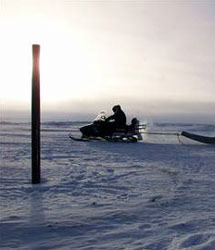 |
 |
 |
 Editorials | Environmental | March 2005 Editorials | Environmental | March 2005  
Polluting Paradise
 The Guardian UK The Guardian UK


| A native hunter who lives inside the Arctic National Wildlife Refuge drives past a pipe left from a 1986 oil drilling test by Chevron and BP, the results of which only the companies know. The test pipe is 13 miles southeast of Kaktovik, the only town in the refuge. (Photo: Jack Smith/AP)

|
Alaska's wilderness is a place of frozen tundra, calving caribou, wolves, polar bears, millions of migrating birds and stunning natural beauty. But that has not prevented the US Senate from preparing to open it up for oil and gas exploration that environmentalists warn will have disastrous results. Wednesday's 51-49 vote, on an obscure budget amendment that prevented a democratic filibuster, ended a long struggle with big oil companies and has fuelled concerns that other unspoilt corners of America will be blighted by drilling rigs, pipelines and the ugly infrastructure that goes with them.

It was, protested John Kerry, "a Republican sneak attack on one of our most treasured natural wonders". Legal barriers remain, but this is the first time in two decades that the White House and Congress have agreed that US national energy needs justify touching what had hitherto, rightly, been untouchable.

The 19m-acre Arctic National Wildlife Refuge, nestling between the Yukon and the Beaufort Sea, is the last place in North America where the full fragile spectrum of arctic life is protected in one expanse. Intense lobbying has been complicated by contradictory messages: some oil companies say damage will be minimal while others are not convinced of the area's economic potential. Crucially, though, Republicans see the plan as paving the way for other environmentally controversial projects such as drilling off Florida or California.

The threat to the Alaskan paradise known as America's Serengeti is a direct result of George Bush's campaign promise, in 2000 and again last year to reduce US reliance on energy imports, especially from the Middle East: currently 58% of the 21m barrels a day used by Americans comes from overseas. With China's boom fuelling world demand - and sending US crude to a record $56 high on Wednesday - drilling in Alaska, as Mr Bush put it, "is a way to get some additional reserves here at home on the books".

But oil experts say that even at peak production, new fields in the refuge could produce just 1m barrels of oil a day, or 5% of current US consumption. It is absurd to imagine that America, with just 3% of the world's oil reserves and consumption of a quarter of all oil production, can achieve energy independence. This crisis can only be solved by guzzling less gas and searching harder for alternative and renewable supplies. That would in turn allow the US to play a greater part inefforts to combat global warming. Nature, in all its American glory, should be left in pristine peace. | 
 | |
 |



